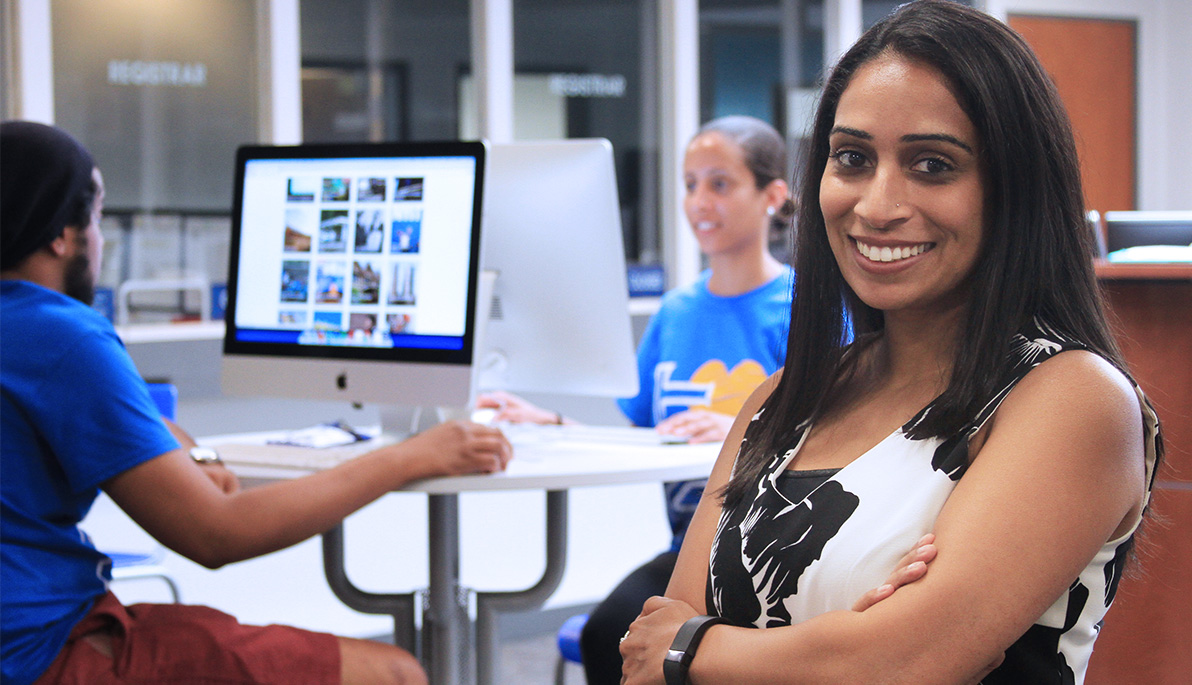News
What Every Student Should Know about the Enrollment Services Center (ESC)
July 11, 2016
Photo: Deepa Bhalla in the Enrollment Services Center at NYIT-Old Westbury. The redesigned space now enables multiple managers to assist students at the same time, reducing wait times.
The Enrollment Services Center (ESC) is a one-stop-shop for students who seek answers and guidance about registration, financial aid, and other issues related to the “business” of college life. The Box caught up with Deepa Bhalla, assistant dean and director of the Enrollment Services Center, to discuss how the ESC is evolving and working to serve students better.
The Box: Walk us through how the ESC helps students.
Deepa Bhalla: Each day is different. You can’t predict the kind of questions a student will walk in with. If you think of a branch bank, 80 percent of questions can be answered quickly at the desk, but some require intervention from experts. That’s the model we follow.
At NYIT, we work together to service the students. The students are the purpose of our work. We’ll review their schedule and financial aid package and highlight any items that need to be completed. We’ll explain how to join a payment plan, or we’ll help with getting immunization records complete. We want students to know what resources are available to them.
For example, to be eligible for maximum financial aid, students need to make sure they maintain satisfactory academic progress. There are implications to dropping a course or receiving an incomplete, and a student’s financial aid package may be revised as a result. ESC managers reach out to these students and guide them through the process.
Why was the Student Solutions Center renamed the Enrollment Services Center this past spring?
The center was created in 2006 to reduce student frustration—to help them avoid the runaround. The name Student Solutions Center was misleading because it sounded like we could come up with solutions to all problems. We’re not counselors. We’re focused on helping students resolve issues related to enrollment.
How has the center changed?
We’ve changed the specific caseloads of our managers to provide more personalized guidance to freshmen. Managers are assigned to work with freshmen either after placement exams or based on the Foundations of Inquiry course. Now, we play an active role right from when a student starts. We are focusing on freshmen because the first year is a heavy transition period into college life. That said, all students are welcome and encouraged to use our services at any time.
What are you doing to improve service to students?
I was a student at NYIT years ago, so I always try to empathize with the challenges they might be having. We may have answered the same questions many times, but we always have to remember that this is the first time the student is hearing the answer. When it comes to our international student population, which has grown tremendously, we also try to be very mindful of how we discuss services—for example, most international students won’t necessarily understand certain terminology we view as common in our field of work.
We’ve also made technical and logistical changes, like adjusting our hours of operation to accommodate the different ways students use the center on the different campuses. In Old Westbury, students like coming in earlier, while the Manhattan students tend to come in later. By changing the hours for both centers, we are better meeting the student demands.
The new layout in the Old Westbury ESC now enables multiple managers to assist students at the same time, reducing wait times. We’ve also installed keypads where students can input ID information, so it’s more private, secure, and accurate. Even small changes like that can make a big difference.
We ask every student we help to take a survey that’s on an iPad at the desk. It only takes seconds. This past year, 98 percent of the students that were serviced by the ESC left the center satisfied with their issues resolved. We worked with the other two percent to understand how we could better serve them moving forward.
With all this in mind, what can students do to be prepared before the fall semester starts?
Above all, be proactive instead of reactive—that way, you’ll avoid panic mode. Also:
- Check your NYIT email account.
- Make sure your FAFSA is complete (as soon as you can—it’s already past the due date) so your financial aid package can be processed in a timely fashion.
- Make sure you’re registered. Do it now. Don’t come in at the end of August or when the semester begins. You’re more likely to get into the courses you want in the sections you want.
- Pay your bill by August 1.
- Make sure everything is in place so you can enjoy your summer.
Finally, if students have any questions or concerns, they should talk to us. Students shouldn’t assume or feel that they have to know all the answers—it doesn’t matter if the issue is big or small—whatever it may be, they should stop in, email, Skype, or call us.




